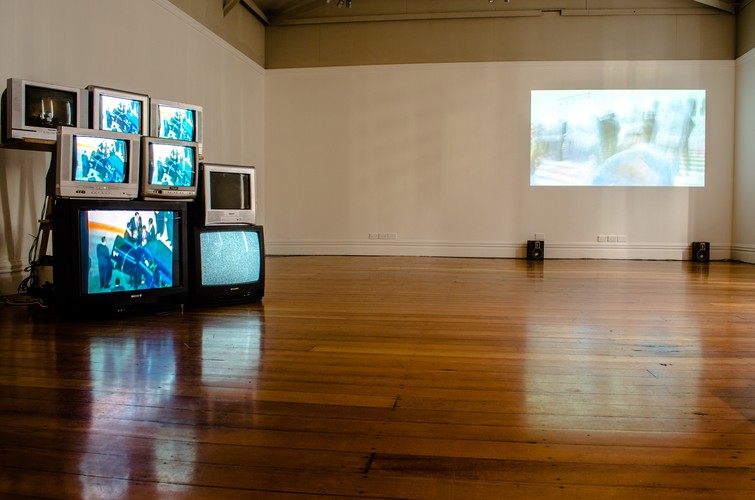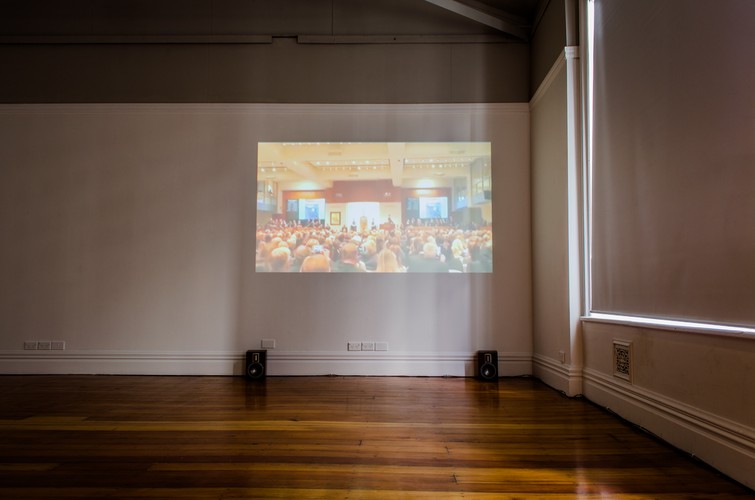Enjoy
Blog
Contents
An Interview with Angela Tiatia
October 17 2014, by Noelia Portela
Angela Tiatia is a New Zealand artist now living in Sydney and has exhibited widely, including Los Angeles, San Francisco, New York, Mexico City and Honolulu.

Angela Tiatia and Shahriar Asdollah-Zadeh, The Screen, 2014. Image courtesy of Oscar Perry and Enjoy Gallery © The Artist and Alcaston Gallery, Melbourne
Through her practice, Tiatia explores structures and exchanges of power - and how these interactions affect identity.
I was very interested by her recent work at Enjoy Cream (2014) An assemblage of videos taken from YouTube, this work brings together two events that occurred in mid 2012 – the record-breaking sale of Edvard Munch’s ‘The Scream’, and rioting in Europe spurred by a climate of economic crisis.

Angela Tiatia and Shahriar Asdollah-Zadeh, The Screen, 2014. Image courtesy of Oscar Perry and Enjoy Gallery © The Artist and Alcaston Gallery, Melbourne
I decided to bravely write her a few questions. This is what she said:Noelia: I'm curious about the creative process of juxtaposing ideas, or how they connected at first - what attracted you to these ideas? How did that start?
Angela: I use juxtaposition as a tool to accentuate differences in images, ideas and situations. However, there are layers of conflict at play: There is conflict in the images/footage e.g., protestors being hit by police, competing bidders at auction; but there is also an internal conflict in the viewer that the artist can provoke by placing seemingly unrelated images together. For me this is a way of driving an idea forward to engage the viewer in the absence of an obvious narrative.
Noelia: You mentioned the increasing gap between rich and poor as a topic that concerns you in your work. Do you believe New Zealanders should be more exposed to these kinds of conversations and ideas?
Angela: Yes. Absolutely. And many know and experience this inequality within their daily lives. The gradual nature of this growing inequality is deceiving because it normalises the problem - we don't notice the change because it's incremental. The solutions to anything this complex are clearly nontrivial, and will require a breadth of responses, including government policy, economic and social change. Regardless of how the change is enacted, it needs to start with conversations addressing this subject, which are currently happening.
Noelia: I like when you said "art has become one of the most conspicuous expressions of an elevated social status for a new class of uber-rich” and this reminded me of a conversation I was having with a friend a few days ago about the power of the artist (or not) to inflate the price of their art works. How do you feel about your responsibility as an artist and contributor to this relationship?
Angela: We live in interesting times. Global culture values celebrity - we have celebrity chefs, celebrity businessmen, celebrity builders and of course celebrity artists. The industry of "art stars" manipulates the art market. Whether this manipulation is manufactured as part of an artists practice or not, it is very telling of our culture and our values. Broadly speaking, our culture values money, power and celebrity. What is driving this phenomenon is a deep desire to be acknowledged and valued - and money and celebrity is easily measurable (how much money do I have, how many fans do I have, how many "likes" do I have"). It is now generally accepted that this leads to high levels of anxiety within individuals. This anxiety can be very dislocating and disempowering. So in all of this, my responsibility as an artist and contributor to this relationship is to say "hey I see you" - especially when the individual is disempowered. My contribution is to make visible the undercurrents within our culture and how these affect individuals and groups.
